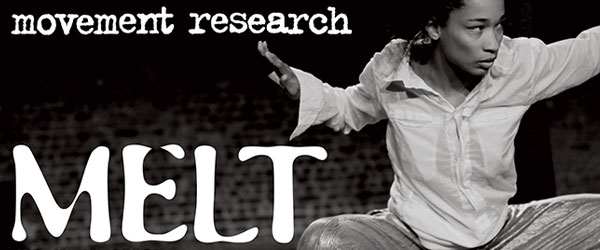Critical Correspondence
Movement Research Performance Journal Project
In celebration of Movement Research’s 30th Anniversary, Critical Correspondence is reprinting monthly excerpts from each of the first 30 Performance Journals. We are featuring representative and relevant articles, selected shorter quotes, as well as each of the issues’ editorial notes.
- read this article
- Comments Off on Movement Research Performance Journal Project
- 12.1.15
MRPJ#13/Body/Belief: Extras
A great part of the problem regarding the sensuous catering to our bodies’ needs is religious in nature. At the heart of the Christian reading of existence, there is a deep distrust and explicit put-down of the sensual, which always seems to be equated with the evils of carnality and lasciviousness. If you couple this […]
- read this article
- Comments Off on MRPJ#13/Body/Belief: Extras
- 8.4.10
MRPJ#22/Ownership: Table of Contents
Winter/Spring 2001 Editors: Sarah Michelson, Tere O’Connor, Julie Atlas Muz Editors’ Notes by Sarah Michelson,Tere O’Connor, Julie Atlas Muz
- read this article
- Comments Off on MRPJ#22/Ownership: Table of Contents
- 5.7.10
Update on the state of the arts in the most current economic stimulus bill
From NYS ARTS (Alliance of New York State Arts Organizations): The Senate and House of Representatives are set to vote on final passage of the economic stimulus legislation – H.R.1, the American Recovery and Reinvestment Act – which includes $50 million for the National Endowment for the Arts.
- read this article
- Comments Off on Update on the state of the arts in the most current economic stimulus bill
- 12.14.09
MRPJ#29/Improvisation is Dead, Long Live Improvisation: Extras
Arturo Vidich: …People have totally different ideas about similar ways of working. For instance, you say you view yourself from outside the body; Deborah [Hay] says position yourself 360 degrees around outside your body. It’s almost the same thing; it’s just how you word it, and what sort of practice you do.
- read this article
- Comments Off on MRPJ#29/Improvisation is Dead, Long Live Improvisation: Extras
- 10.1.09
MRPJ#29/Improvisation is Dead, Long Live Improvisation: Table of Contents
Spring 2005 Editors: April Biggs, Kimberly Brandt, Levi Gonzalez, Isabel Lewis, Alejandra Martorell and Layard Thompson Letter from the Editors
- read this article
- Comments Off on MRPJ#29/Improvisation is Dead, Long Live Improvisation: Table of Contents
- 10.1.09
MRPJ#29/Improvisation is Dead, Long Live Improvisation: Editors’ Note
The assertion that improvisation is dead is meant as a provocation, not a statement of fact. Historically, movements and ideas have been declared dead when they are in fact transforming and taking on new life and vigor. Our aim with this issue is to bring to the surface the dissonance and tension that exist around […]
- read this article
- Comments Off on MRPJ#29/Improvisation is Dead, Long Live Improvisation: Editors’ Note
- 10.1.09
MRPJ#29/Improvisation is Dead, Long Live Improvisation: “The Movement of Attention: An Interview with Daniel Lepkoff” by Simone Forti
December 2004 In November/December 2004 Movement Research produced a dance festival entitled “Improvisation is Hard.” This was in part the occasion for Simone Forti to be in NY. I went to the Bowery Poetry Club and listened to Simone read from her new book Oh Tongue. I bought her book and began reading. A few […]
- read this article
- Comments Off on MRPJ#29/Improvisation is Dead, Long Live Improvisation: “The Movement of Attention: An Interview with Daniel Lepkoff” by Simone Forti
- 10.1.09
MRPJ#27/Then and Now, Section A: Extras
Paul Langland: You and I are both feeling feisty about having the next artistic shift, because we may be in a late post-modern era, but we’re not sure, because it’s too soon to tell, and we may not even realize it’s happening, when it happens, for a while. Yvonne Rainer said of the advent of […]
- read this article
- Comments Off on MRPJ#27/Then and Now, Section A: Extras
- 9.9.09
MRPJ#28/Then and Now, Section B: “Researching Bodies: The Politics and Poetics of Corporeality” by Ann Cooper Albright
Movement Research was founded on a tension. A tension that has remained embedded in this organization for most of its 25 year history. At times this tension has been incredibly productive; but it has also been frequently ignored, like an irksome old injury one hopes will go away on its own.
- read this article
- Comments Off on MRPJ#28/Then and Now, Section B: “Researching Bodies: The Politics and Poetics of Corporeality” by Ann Cooper Albright
- 9.9.09
MRPJ#27/Then and Now, Section A: Editor’s Note
Editor: Clarinda Mac Low I am humbled by the writing here. I can hardly believe that I’ve been lucky enough to be a part of this process, and that is not hyperbole. People allowed me in to deep and wonderful parts of themselves, and showed to me the rough diamonds of their words. From Susan […]
- read this article
- Comments Off on MRPJ#27/Then and Now, Section A: Editor’s Note
- 9.7.09
MRPJ#27/Then and Now, Section A: Table of Contents
Spring 2004 Editor: Clarinda Mac Low From the Editor MR@25, From Executive Director Carla Peterson List of Contributors, Section A and B
- read this article
- Comments Off on MRPJ#27/Then and Now, Section A: Table of Contents
- 9.7.09
MRPJ#27/Then and Now, Section A: “Lack of Entrepreneurial Thrift” by Sally Silvers
I started choreographing when Reagan was elected. My first solo dance (Lack of Entrepreneurial Thrift, 1980) was influenced by a carnival of radicalisms: in Judson Dance Theater, in experimental poetry & film, in the music of free improvisation, in the probes of radical theory. I wanted to anchor my choreography within a consciousness and push […]
- read this article
- Comments Off on MRPJ#27/Then and Now, Section A: “Lack of Entrepreneurial Thrift” by Sally Silvers
- 9.1.09
MRPJ#28/Then and Now, Section B: Table of Contents
Spring 2004 Editor: Clarinda MacLow Impossible Possible Ossuary by Daria Fain Letter by Jill Johnston Gnosticism by Jonah Bokaer
- read this article
- Comments Off on MRPJ#28/Then and Now, Section B: Table of Contents
- 8.30.09
MRPJ#28/Then and Now, Section B: Extras
Henry James said that the tragedy of America is that it’s incapable of accepting any sense of itself as tragic (though based on a genocidal, biocidal land-grab and slave trade). Walt Whitman wrote that America would not be a great nation until it could produce a negative on a scale with itself. And in its […]
- read this article
- Comments Off on MRPJ#28/Then and Now, Section B: Extras
- 8.30.09


